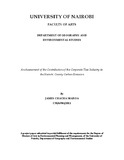| dc.description.abstract | The automotive industry is a big contributor to the global carbon emissions. Most developed
countries have continued to research towards reaching an agreeable emissions estimate not
only at the country level but further into respective economic sectors. It is even possible to
accurately calculate a family’s daily carbon emissions and make emission friendly decisions.
In Africa, beyond the continent estimate, it is impossible to ascertain industry or country
specific footprint. This study thus seeks to bridge this gap by use of quantitative research
approach to establish the emission potential of corporate taxi industry taking the case of
Nairobi County. With the objective of establishing the growth rate of the corporate taxi
industry in Nairobi County and further quantify the corporate taxi industry carbon emission
contribution to the Nairobi County footprint. This study presents the industry growth rate,
challenges experienced by the industry stakeholders, biases to choice of taxi vehicle, the
industry preferences and knowledge of existence of other green vehicle alternatives. The
study employed calculation based method and a generalised methodology to calculate the
carbon emission and defends the null hypothesis. It is evident from findings that there is a
consistent growth in the corporate taxi industry and an equal significant contribution of
carbon emission. Using the collated information, the study projects the possible industry
emissions scenario in the event the current status remains whilst presenting players-felt
solutions. The study recommends government initiatives in setting up promotive and control
policies and regulation to guide the industry towards adopting clean alternative vehicles to
reduce carbon and automotive emissions. This may include control, incentives and public
awareness program. Besides the Fossil Fuel Emissions Control Regulations, other sectorspecific
regulatory controls like Fuel Economy Standards to encourage reduced transport
related fuel demand through vehicle fuel efficiency improvements among other controls are
recommended. The study recommends areas for further research work for instance the need
to research on the emission streams from varied industries into Nairobi carbon footprint i.e.
construction, agriculture, manufacturing, transport etc. The research hopes to create
awareness and build on past works on urban air pollution in Africa and trigger further
research in the area of automotive emissions. | en_US |

